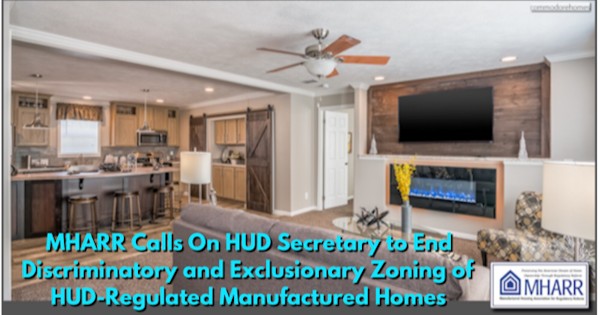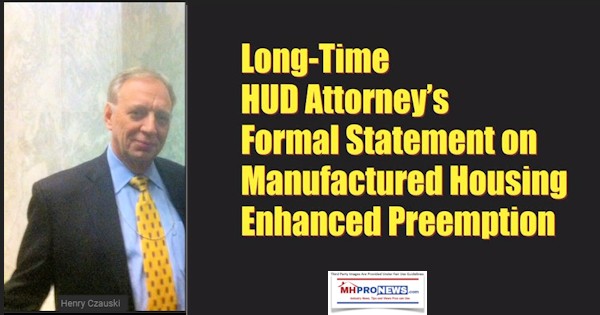
This report will begin by laying out some facts from federal testimony before Congress, and will then provide some related background information. The relevance to the industry’s historically low levels of new HUD Code manufactured home shipments should be discerned by thoughtful professionals, investors, and curious federal and other public officials. It will draw to a close by reviewing the implications of those facts with respect to recent manufactured housing controversies.
A download of this federal testimony which is linked further below is fascinating on several levels that MHProNews has periodically covered with increased focus in 2019. The federal document was entitled as follows.
IMPLEMENTATION OF THE
MANUFACTURED HOUSING IMPROVEMENT ACT OF 2000
Among those who testified in a Capitol Hill hearing on this subject was the following federal official.
“Czauski, Henry S., Acting Deputy Administrator, Office of Manufactured Housing,” according to that federal record.
Regarding the preemption of the HUD Code under the Manufactured Housing Improvement Act (MHIA), this was Czauski’s testimony. As MHProNews has often done for years, we turn quoted text bold and brown to make it ‘pop,’ but otherwise the text is unchanged from the original, which is available further below as a download.
“Federal Preemption
Federal preemption was a key concept in the National Manufactured Housing Construction and Safety Standards Act of 1974. It provided that once Federal standards were established, no State or political subdivision would have the authority to establish any standard which is not identical to the Federal standards. The 2000 Act added language to this provision that Federal preemption should be “broadly and liberally construed to ensure that disparate State or local requirements or standards do not affect the uniformity and comprehensiveness” of the Federal standards. The major benefit of preemption is that it allows a manufacturer in one state or local government jurisdiction to deliver and install a home built to the Federal Code, rather than having to build each home to conform to the code of the local jurisdiction where the home will be sold. HUD was charged with implementing Federal preemption, which the agency continues to do. If and when HUD receives information suggesting that a jurisdiction is attempting to enforce State or local standards, HUD issues a letter to that jurisdiction informing them that the local laws are subject to Federal preemption. Enforcement of preemption has been carried out through education and notification…”
The balance of Czauski’s testimony, per federal records, are linked as a download here.
When you read that about federal enhanced preemption from a now former official at HUD, it begs a one word question. Seriously?
Despite the assurances of Czauski, who is an attorney, to those in that congressional hearing room,
- there are only a limited number of cases MHProNews is aware of where HUD contacted a local official about enhanced preemption.
- A different attorney who served HUD for years told MHProNews that yet another HUD attorney purportedly avoided pushing enhanced preemption.
- Based upon years of statements from the Manufactured Housing Association for Regulatory Reform (MHARR), and more recent ones from the Manufactured Housing Institute (MHI), both of those tend to undermine the assurances made by Czauski to Congress. One such example is linked here.
- For reasons that will be made clear in an upcoming investigative report on MHProNews, there were but few such statements as the one linked above to Richland, MS, especially given the assurances offered by longtime HUD attorney Czauski.
As a pair of third-party backdrops for balance, according to HUD’s 2011 ManuFACTured Housing Newsletter for June 2011:
“Henry Czauski, Senior Advisor in the Office of Risk Management and Regulatory Affairs will be assuming the position of Acting Deputy Administrator for the Manufactured Housing Program. He has worked with Teresa and Liz during the past year on improving the administration of the program and has had the opportunity to meet many of the key players and beneficiaries of the program. Prior to coming to the Office of Housing, Henry was in the Office of General Counsel where he served in various positions including Deputy Director of the Departmental Enforcement Center, HUD’s Regional Counsel for New York, Chief Counsel for the New Jersey and District of Columbia Offices and as Senior Attorney in the Office of Assisted Housing and Community Development. Please welcome him in his new position.”
LinkedIn shed this background information on Czauski, who is now listed as a consultant. The below would reflect Czauski’s self-description, and the above would be a more official HUD statement on his bio.
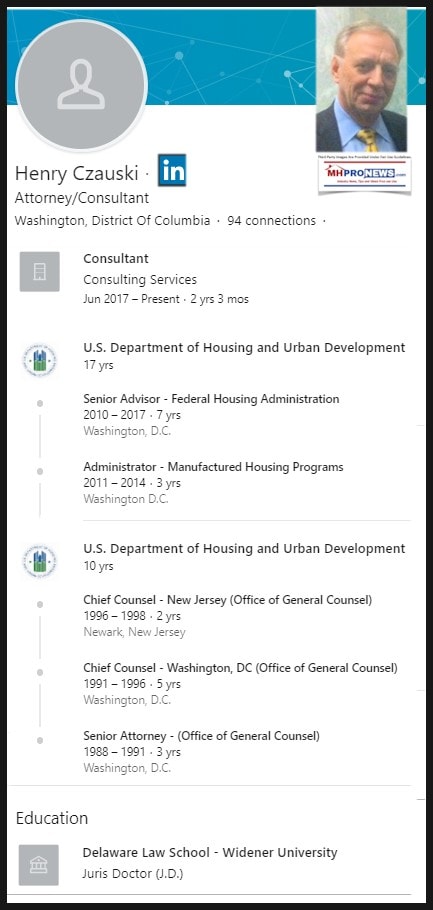
So, with that background let’s look at the former HUD OMHP attorney’s comments to what today is the House Financial Services Committee.
Czauski’s comments on enhanced preemption are generally accurate as far as it goes, arguably other than on the issue of enforcement of enhanced preemption. But let’s begin with the wheat from the testimony.
Specifically, after the MHIA 2000 law, preemption is no longer limited to just state or local building standards. But when you look at more deeply into the MHIA, the amended language states — and the following will highlight with italics and black text the original legal wording that is most important — “Federal preemption under this subsection shall be broadly and liberally construed to ensure that disparate state or local requirements or standards do not affect the uniformity or comprehensiveness of the standards promulgated under this section nor the federal superintendence of the manufactured housing industry as established by this title.”
Federal “superintendence” of the industry “under this title” means the Manufactured Housing Improvement Act of 2000. That includes advancing the purposes of that title, which reference (italics added) “facilitat[ing] the availability of affordable manufactured homes … for all Americans.”
>>> Achieving that “for all Americans” cannot be done if discriminatory zoning exclusions and placement restrictions make manufactured homes unavailable for millions of Americans in communities across the country. That sentence bears another reading.
Therefor “broadly and liberally” – under the MHIA of 2000 – means what it said, and said what it meant. While it took a long, long time – as did the DOE energy rule and other issues – after sustained pressure, MHI in July began to pivot on making “enhanced preemption” an issue. Now, at least on paper, MHI has joined MHARR in saying in writing that enhanced preemption is necessary and important to promote. But given that this federal testimony of Czauski was from 2012, and MHI had representation in that same hearing, that begs a serious question. What took them so long to come around on promoting the full meaning under the MHIA of federal preemption? More on potential ripple effects of such details in the report linked below.
Publicly Traded Manufactured Housing Firms – Which Source Do You Trust More? Why? MHI, MHARR, Others
MHProNews – Talking to Democrats and Republicans in Washington, D.C.
In a conversation recently with a federal official in Washington, D.C., MHProNews’ publisher, L. A. ‘Tony’ Kovach said that for some time there has been questions and doubts if HUD Secretary Ben Carson was fully briefed on enhanced preemption. See a report on that topic linked below. With that in mind, that public officials asked Kovach, ‘is it possible that Dr. Carson is just trying to avoid ruffling feathers of local officials? Is he potentially trying to win them over, instead of hammering them?’ That was an astute query, and certainly is a theoretical possibility. But to learn more about that matter, click the report below.
But hypothetically, if HUD Secretary Carson is trying to start off softly and be persuasive as opposed to using the federal legal hammer, there are good arguments to be made that Dr. Carson has already indicated an interest in the Affirmatively Furthering Fair Housing (AFFH) principle. If he is willing to signal an interest in that, which implies a use of federal authority of local zoning, then when not take a more direct route available on enhanced preemption? Or why not use both AFFH and enhanced preemption, which would create a broader coalition of legal support across the left-right spectrum?
Furthermore, just as Secretary Carson has learned to make a solid argument on behalf of manufactured homes, so too he could learn the kind of points that are made in the report linked below. That report, using third-party information, makes the case why most of the country would financially benefit from enforcing enhanced preemption. Small business expert Tom Egelhoff happens to be a manufactured homeowner. He and MHProNews publisher L. A. ‘Tony’ Kovach did this article linked below in 2018 for Value Penguin, later republished on MHLivingNews with illustrations not in the original.

That is shared for a variety of reasons that address the point made by the Washington, D.C. official’s discussion with Tony Kovach. If Dr. Carson is hoping to convince people, most people have a ‘what is in it or me?’ somewhere in the mix. Egelhoff and Kovach make that ‘what is in it for the vast majority of Americans’ case in the ‘Fear‘ report linked above.
The Trump Administration, or whomever implements federal law fully and properly, will create per the research cited some 2 trillion dollars in new Gross Domestic Product. That means millions to billions of dollars in opportunities at the local level, effectively achieved without big federal spending; mainly by enforcement letters from HUD to local officials. When HUD or a federal agency flexes its muscles over a local city or town, they routinely comply.
Additionally, the use of the sound arguments to be made in the FEAR report fits with the Opportunity Zones, that Secretary Carson is also seriously involved in.
Over 100 Million Reasons to Act?
According to Apartment List in 2018, there are an estimated 111 million Americans living in rentals. Most of those, per the NAR’s seminal research on manufactured housing found as a download in the report linked here makes clear, most renters could afford a manufactured home.
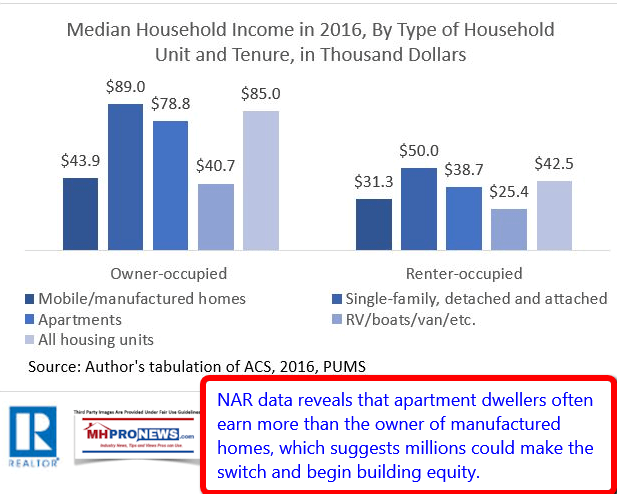
Implementing existing law found in the MHIA would arguably raise over time the value of existing manufactured homes, other housing continues to gain value, and roughly 1/3 of all Americans who are renting would gain an opportunity for their part of the American dream. That fits claims made by the Trump Administration’s goals, and the goals of candidates on both sides of the left-right political divide. It would occur without more taxes, etc. In fact, as the Rev. Donald Tye, Jr. said, it would actually add to the tax base of local jurisdictions.
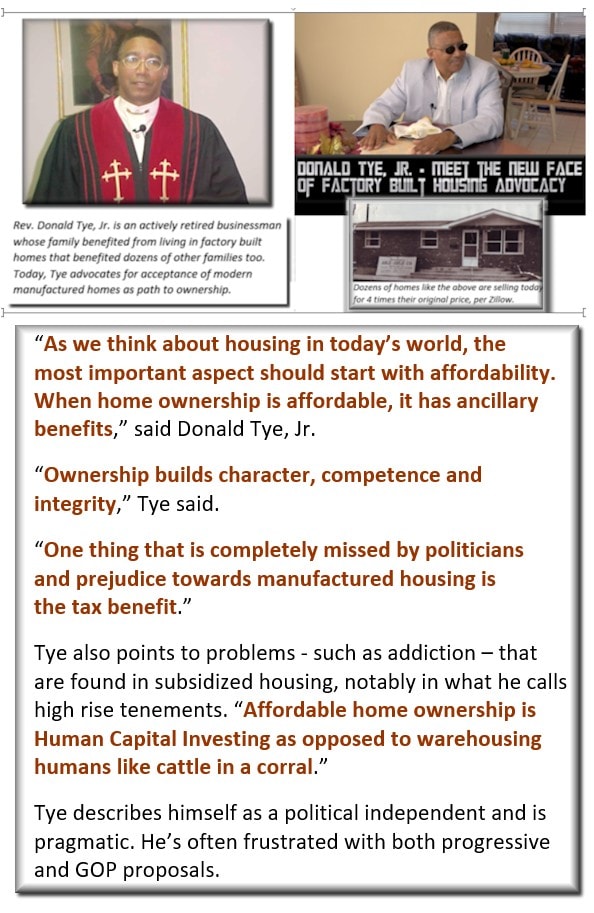
Finally, what about those who own a conventional home? HUD addressed that too in a 2011 HUD PD&R that said that manufactured homes and conventional houses appreciated side by side. See that report as a download linked under photo in Figure 2:4 from the page linked here.
Summing Up
The bottom line? Henry S. Czauski, JD, in his testimony before House Committee on Financial Services Feb 1, 2012 underscores that this critical and largely underused aspect of federal law could be a ‘game changer’ for manufactured housing. It could bring to life HUD Secretary Carson’s prescription for a better America, outlined in the report linked below. As the MHIA was bipartisan legislation that still enjoys bipartisan interest and support, it is a common sense way to advance an agenda that would increase the household wealth of potentially tens of millions of Americans over time. So what’s been the hang up for all of these years since the law was first passed?
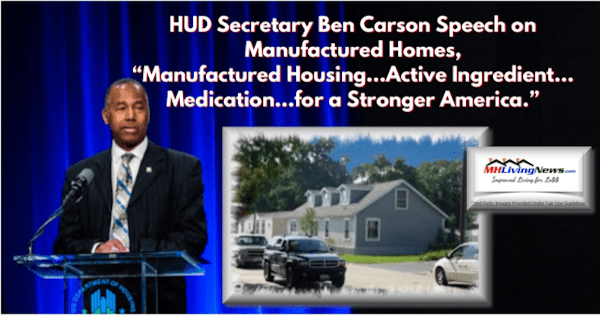
Who has benefited from not enforcing this good law? See the related reports, linked further below for more. That’s this morning’s initial episode of manufactured home “Industry News, Tips, and Views Pros Can Use” © where “We Provide, You Decide.” © ## (News, analysis, and commentary.)

Soheyla is a managing member of LifeStyle Factory Homes, LLC, the parent company to MHProNews, and MHLivingNews.com.
Connect with us on LinkedIn here and here.
Related Reports:
Click the image/text box below to access relevant, related information.
Under Pressure, MHI Pivots “HUD Must Implement and Enforce its Enhanced Preemption Authority”
“Revolving Door” – 2019 Research by Public Citizen Spotlights Swampy Problems
